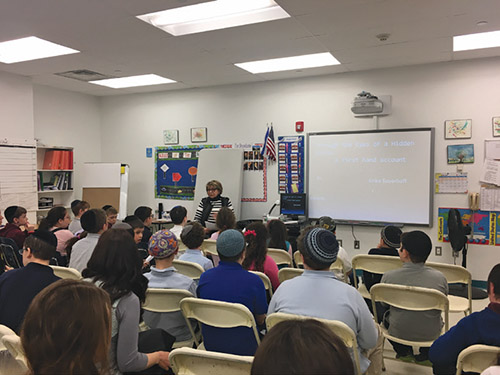
Sometimes, an individual can have a tremendous impact on the collective strength of his or her community. This was demonstrated recently at SINAI Schools at RYNJ, when Erika Sauerhoff, a child Holocaust survivor, spoke to SINAI’s middle school students about her experiences and reflections pertaining to the Holocaust. One of the teachers at SINAI at RYNJ is a fellow congregant of Sauerhoff’s at Congregation Adath Israel in Hillside. She seized the opportunity and recruited Erika to address her students as part of their observance of Yom HaShoah.
As with each of SINAI’s schools, the students at SINAI at RYNJ have a range of complex disabilities. It is challenging to present emotionally sensitive and difficult topics such as the Shoah to any group of children; this is magnified when children have special needs or complex learning challenges.
In a slideshow presentation, Sauerhoff related that she was 3 years old, living in Paris, when the war broke out. Sauerhoff’s father had joined the French army, as did many foreigners, and was subsequently sent to a labor camp. In order to save her daughter’s life, Erika’s mother sent her to live with the Blanchards, a gentile family. The Blanchards, according to Sauerhoff, did not know that she was Jewish and accepted her into their family in order to proselytize her to Christianity. Eerily, the family’s business was production of child-size coffins, and they often used young Sauerhoff as a human yardstick for their measurements. She was baptized and lived a Christian life until after the war, when she was reunited with her family. By the time she returned, at age 7, her father had been murdered and her mother was a struggling young widow with four children and a younger brother to take care of. Sauerhoff was unhappy about leaving the Blanchards and did not want to return to her former Jewish life. She became distanced from her mother as well as the practices and beliefs of Judaism. Many years later, she returned to the fold, married and raised a daughter, who, together with her family, continues to give Sauerhoff much Jewish joy.
The SINAI students were mesmerized and touched by Sauerhoff’s story. They were able to appreciate her struggles, both emotionally and physically. Upon hearing of her late-in-life return to Jewish studies and Torah practices, one of the students exclaimed, “You are like a modern day Rabbi Akiva who also discovered Judaism when he was older!” Another student found her story poignant and, visibly moved, he remarked, “I am so sorry that you are an orphan!” and then asked, “Your mother didn’t love you?” expressing his bewilderment at how Sauerhoff’s mother “gave her away” to the Blanchards. Still another student articulated his total disbelief at her having to leave her family, asking, “Your mother was murdered?” because he could not understand why she otherwise would live with the Blanchards.
Sauerhoff patiently interacted with the students, charging her young listeners with a number of life lessons that she has gleaned from her tumultuous experiences. She expressed deep remorse over her disconnect with her mother when she returned after the war and confided to the students that only now does she appreciate how brave her mother was to do what she did to keep her alive. Erika wishes she could turn back the clock and have the opportunity to talk and become close with her mother. The young adults were admonished to “be an ‘upstander’ and not a bystander, seek justice and not to ever tolerate bullying.” Her final charge to the assembled, as the next generation that must continue the chain, was the reality that “the future is yours to own—own it.”
As a result of this talk, SINAI middle school students were exposed to the first-hand, eyewitness account of a survivor, as well as an understanding of some of the cruelties of the Holocaust through the eyes of a child. Sauerhoff’s presentation was illustrative of how children of all abilities should be given the opportunity to gain appreciation of their heritage, even when, like the Shoah, it is painful and difficult to comprehend. These SINAI students were charged with the responsibility of their future. Sauerhoff impacted all who were fortunate to hear her presentation, linking them into the strong and everlasting chain of our tradition, history and community.
Dena Mayerfeld is a learning disabilities teacher consultant and a middle school teacher at SINAI Elementary at Rosenbaum Yeshiva of North Jersey, including the Riva Blatt Weinstein Judaic Studies Program. For additional information, visit the SINAI blog at www.sinaischools.org/blog.
By Dena Mayerfeld













